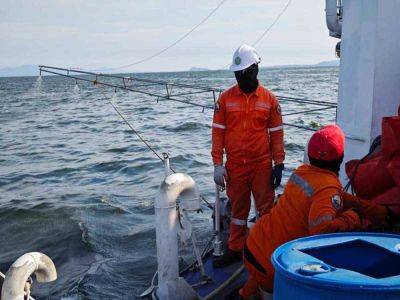Ship leaks molasses into the waters of Negros Occidental
MANILA, Philippines — An unknown amount of molasses spilled into the waters of Sagay Feeder Port in Negros Occidental, the Philippine Coast Guard (PCG) said on Thursday.
The MT Mary Queen of Charity was conducting regular, shore-to-shore operations when discoloration was observed in the waters surrounding the vessel. A total of 300 metric tons of molasses were already loaded when the leak was noticed.
“The port personnel suspected an undetermined volume of molasses spilled during the operations,” the PCG said.
The PCG Marine Environmental Protection Unit is currently conducting water sampling, and coordinating with the local government unit.
The Coast Guard response team directed the master of MT Mary Queen of Charity to file a marine protest regarding the incident.
The MT Mary Queen of Charity is not the only ship leaking a dark substance into Philippine waters. The MTKR Terranova, MTKR Jason Bradley and the MV Mirola Uno have been the PCG’s headache after the first two sank while the third ran aground. All three ships are leaking oil into the waters of Bataan.
Molasses is a thick brown syrup made from the byproduct of sugar. It is often used as a substitute for sugar.
While it is not oil, molasses could still have a negative effect on the marine environment. According to a report from the National Geographic, a massive molasses spill in Hawaii in 2013 devastated local marine life.
Unlike oil, which stays on top of water and can be skimmed, the sticky substance sank to the seafloor, suffocating the fishes. Local authorities in Hawaii said that there was little they could do to clean up the mess, as there were no contingency plans for it.
However, molasses is soluble in water, which means bacteria can eat it and it will not leave the same trace like oil does.







